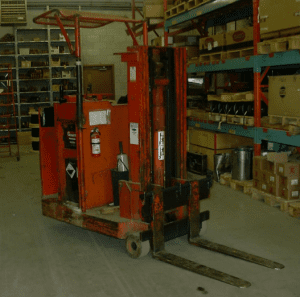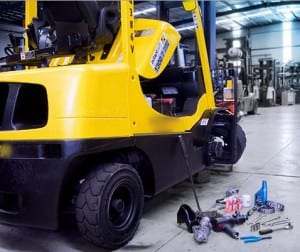It’s the spring season and summer is around the corner. It will soon be the time when Classic Car shows pop up all over attracting gawkers and enthusiasts, who flock to admire old cars that are lovingly rebuilt, refurbished and  maintained to a condition that defies the age of the automobile. The same does not hold true for forklifts. As much as it may pain those of us in the material handling world, there are no traveling classic forklift shows, but if you hunt you can find them in some warehouses.
maintained to a condition that defies the age of the automobile. The same does not hold true for forklifts. As much as it may pain those of us in the material handling world, there are no traveling classic forklift shows, but if you hunt you can find them in some warehouses.
I am always surprised by how modern warehouses are using old equipment with antiquated technology, high maintenance costs, high energy consumption, low productivity, and ridden with downtime. These are expenses that slowly eat away at your bottom line bite by bite and many times the entirety of the costs involved are not even realized. Take a hard look at what needs to be considered in making a decision of whether to retire a vehicle. Buying a new forklift is not unlike considering a new car purchase.
The first thing that typically occurs is the sudden repair bill that was not expected or reoccurring bills that draw ones’ attention that a lot of money is being expended into keeping a truck going. Maintenance costs, in a general sense, are somewhat predictable. All things being equal, most new forklifts have major parts warranties for three years, so you can figure that there will be few modest costs involved. But as the machine ages, you can start to see these climb year after year. You may want to call it a five-year itch for batteries and five to seven for trucks in a high-use challenging environment. It always makes sense to look at your year-over-year maintenance costs as contrasted to a new truck.
 The next consideration is down time. Very often this is not factored in or a number isn’t put to it, but it does directly impact the bottom line. How long does it take for the repair van to get there? Is the problem fixed on the initial visit? Does a part have to be ordered? Do you want your operator pushing a broom or picking product for shipping?
The next consideration is down time. Very often this is not factored in or a number isn’t put to it, but it does directly impact the bottom line. How long does it take for the repair van to get there? Is the problem fixed on the initial visit? Does a part have to be ordered? Do you want your operator pushing a broom or picking product for shipping?
Another cost lost in the mix is energy consumption. Drawing on the car analogy again, some of us remember when automobiles were big, had a lot of heavy metal, and were gas guzzlers. Who cared when gas was $0.32 per gallon? Gas went way up, cars got a lot smaller, metal was replaced with plastic and the technology leading to increased energy efficiency gets better every year. Do you want eight miles a gallon or thirty?
Lastly, newer forklifts have technologies that enhance performance and make it easy on operators. Maneuverability and braking are enhanced in new trucks. Displays and dashboards are easier to read, indicators and warning mechanisms are louder, and today’s designs take operator comfort, safety, and productivity into consideration.
When all the factors are weighed, the question could well become, “Can you afford not buying a new forklift”?



Leave a Reply
You must be logged in to post a comment.